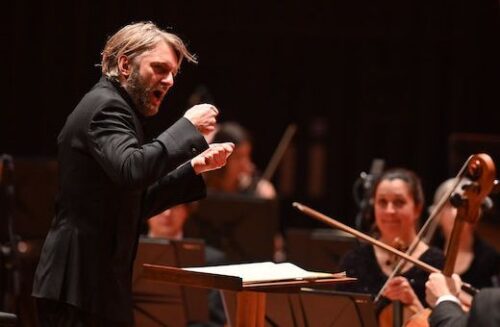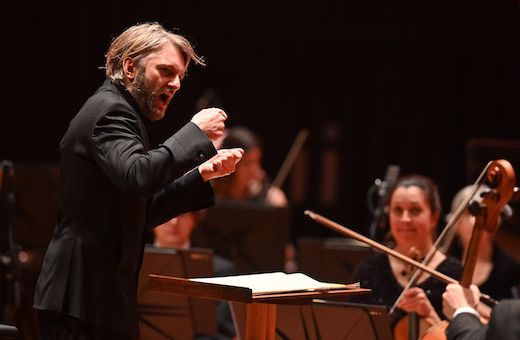 United Kingdom Debussy, Bartók, Elgar: Sunwook Kim (piano), Bournemouth Symphony Orchestra / Kirill Karabits (conductor). The Anvil, Basingstoke, 3.2.2023. (NB)
United Kingdom Debussy, Bartók, Elgar: Sunwook Kim (piano), Bournemouth Symphony Orchestra / Kirill Karabits (conductor). The Anvil, Basingstoke, 3.2.2023. (NB)

Debussy – Prélude à l’après-midi d’un faune
Bartók – Piano Concerto No.2
Elgar – Symphony No.2
An impressive and powerful concert of the three very different – but demanding – orchestral showpieces performed by the Bournemouth Symphony Orchestra under their chief conductor for the last fourteen years Kirill Karabits who announced that he is stepping down from the role just last month – he will be a hard act to follow.
Debussy’s Prélude à l’après-midi d’un faune continues to astonish nearly 130 years after it was written. Karabits’s approach proved to be a touchstone for the music-making through the entire evening. Passages of sun-drenched torpor are languorously indulged but then again he is willing to push the music forward with a febrile intensity. This will only work when you have an orchestra as well-attuned and responsive as the Bournemouth players are. The famous opening flute solo was played here by principal Anna Pyne with a dusky mellow warmth that caught in just a few notes the dozing heat of a summer afternoon. The collective string sound of the Bournemouth orchestra is not as weighty or rich as some but in its place is a sinewy strength and power that was well suited to Karabits’s fluid approach. Likewise the ever-excellent acoustic of the Anvil Basingstoke allowed the extraordinary detail and precision of Debussy’s scoring to register right down to the shimmering crotales that close the work. Given the drama and muscularity of much of the rest of the concert this was a beautiful and intelligent piece of programming beautifully executed. Karabits conducted this work and indeed the entire concert without a stick – interestingly the publicity photographs of him in the programme show him with a baton so whether this is a recent change in technique or something he felt appropriate for this particular music is not clear but throughout he was exceptionally clear for the players both in terms of placement of the beat and expressive intent.
The orchestra was joined by Korean pianist Sunwook Kim for a playful and athletic account of Bartók’s Piano Concerto No.2. It comes as something of a surprise to realise that Kim won the Leeds International Piano Competition as long ago as 2006 when he was just 18 becoming – at the time – the youngest winner for 40 years. Seventeen years later he is still a young performer but with a mature stage presence and an almost casual virtuosity. Bartók wrote the work for himself to perform on tour but was clearly not concerned about making the music easy to play. The soloist plays music of great complexity for the majority of the work’s near half-hour span. Kim’s particular skill was to make this work seem more playful and agile than the percussive powerhouse it can sometimes become. Of course he had plenty of attack and power in reserve too, but clarity and articulacy were the watchwords.
For the orchestra this cannot be a very familiar work with accuracy of ensemble a particular challenge as Bartók wrote passages of fragmentary but trickily intertwining complexity that are hard to fit together and easy to fall apart. But again Karabits was a model of clarity and the orchestral accompaniment was brilliantly achieved. One of the unusual features of this work is that each movement is scored for different combinations of orchestral instruments. The first movement Allegro is a bustling toccata-like piece for wind, brass and percussion. The complex interchanges between soloist and ensemble were confident and articulate although for once the warmth of the Anvil acoustic resulted in a little blurring of the inner detail. The contrast with the frozen harmonies of strings and timpani in the second movement Adagio and here the poise and elegance of Kim’s playing was very evident as was his sparklingly clean technique in the closing Rondo. The performance and Kim’s playing in particular was warmly and enthusiastically received by the Anvil audience.
In the course of Karabits’s fifteen years leading the BSO I am not sure how often he will have conducted Elgar, especially the Symphony No.2 in E flat which is one of the composer’s undoubted great masterpieces – as the programme noted all the more reason to sympathise with Elgar’s feelings when he noted that the audience at the premiere; ‘sat like a lot of stuffed pigs’. However much Karabits has conducted these works before this was a very impressive, deeply felt and completely convincing interpretation backed up by virtuoso playing from all departments of the BSO. At a stroke Karabits (as has Petrenko, Svetlanov, Rohzdestvensky and many others before him) proved that the idea that Elgar is in some way unintelligible to non-British performers was nonsense. For sure this was a volatile, passionate and immersive experience. Basic tempi across movements feel well within the ‘standard’ range but within those parameters Karabits was willing to push the expressive envelope in almost a hyper-Romantic way. Given that Elgar marked his scores with great detail especially regarding the manipulation of basic tempi there is a school of thought that encourages performers not to add additional rubati over and above the existing markings. Karabits chose his own path – there were moments when he lingered so lovingly over a phrase or moment that the music risked stasis. However, the playing of the BSO was so focussed, so aware of the longer musical line and so responsive to Karabits’s vision that what in lesser hands might have lapsed into indulgence here became completely absorbing.
The pacing within movements was a delight – the great lament of the second movement Larghetto was quite beautifully built with instrumental lines piling up on each other before reaching a cathartic climax. But then Karabits was willing to challenge the orchestra’s virtuosity with the third movement Rondo – Presto crackling with energy and dynamism. Watching an orchestra play this work you realise the extraordinary complexity and detail with the score. For the whole concert Karabits had his violins sat opposite each other on the stage. Of all composers I think Elgar’s music benefits most from this seating arrangement. So often he writes echoing or antiphonal phrases that have a spatial impact in this arrangement quite lost if all the violins are sat together. But all sections of the orchestra are given moments to shine in this score and in this performance shine they most certainly did. The closing Moderato e maestoso again benefited from an ideal combination of well-judged basic tempo around which individual passages could express the complex web of emotions and impulses that lie at the heart of Elgar the man and the music. This is a big work in a literal and metaphorical sense and here it received a big-hearted yet sophisticated performance – again warmly received. I wonder if any of Karabits’s Elgar has been preserved – if not it certainly deserves to be on the evidence of this performance.
An excellent concert – one of the best I have heard the Bournemouth Symphony Orchestra give.
Nick Barnard
